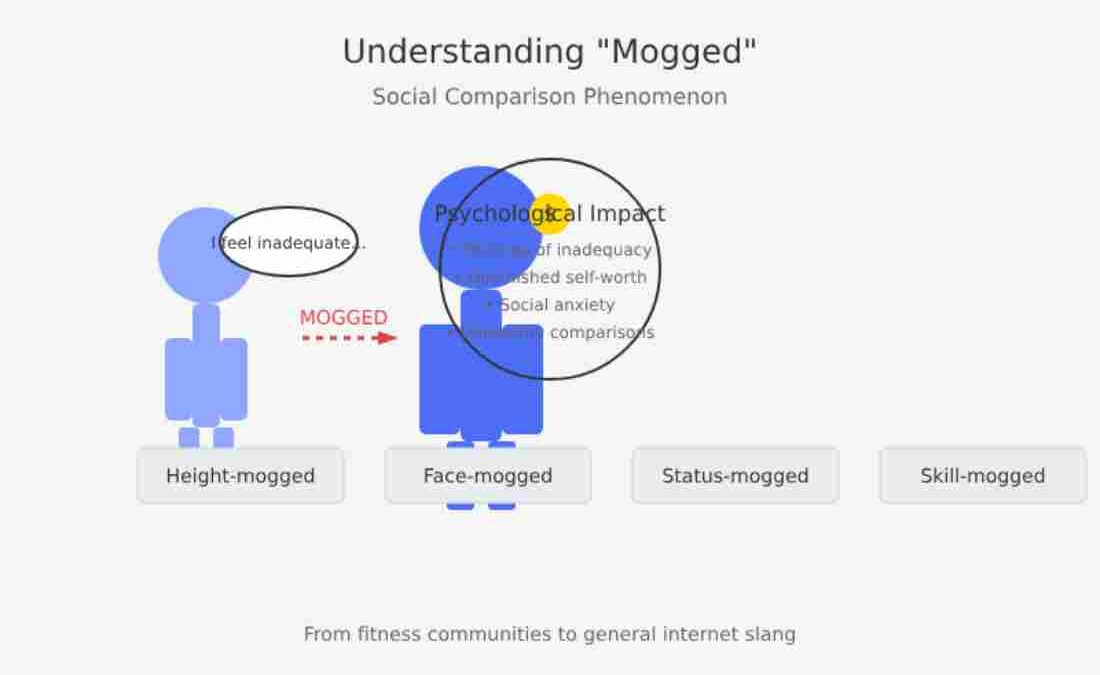Table of Contents
Introduction
The term “mogged” has gained traction in online communities, particularly in forums & social media platforms where slang evolves rapidly. It is often used in discussions about physical appearance, social status, and competition, especially among men. Understanding its meaning, origins, and implications provides insight into modern internet culture and the dynamics of online discourse.
Definition of “Mogged”
Mogged is a slang term derived from the word “mog,” which means to dominate, surpass, or outclass someone, typically regarding looks, height, physique, or social status. When someone says they have been “mogged,” they feel overshadowed or inferior to another person, often in a competitive or comparative context.
For example:
- “I got mogged by that tall guy at the party—everyone was paying attention to him instead of me.”
- “His jawline is insane; I’m completely mogged.”
The term is frequently used in male-dominated online spaces, such as incel (involuntary celibate) forums, fitness communities, and meme pages.
Origins and Etymology
The exact origin of “mogged” is unclear, but it likely stems from the word “mogul,” referring to a powerful or dominant person, or from the verb “to mog,” meaning to move ahead or surpass others. Some theories suggest it originated from bodybuilding or “looksmaxxing” (a term used in online communities for improving one’s appearance) forums where users compare physical traits.
The term gained popularity on platforms like 4chan, Reddit, and Twitter, where users engage in hyper-competitive discussions about attractiveness and social hierarchy.
Usage in Online Culture
-
In Looks-Based Comparisons
The most common use of “mogged” is in discussions about physical appearance. Men might say they were “mogged” by someone taller, more muscular, or with more conventionally attractive facial features. This reflects broader societal pressures around male beauty standards.
-
In Social and Dating Contexts
In dating and social dynamics, being “mogged” implies that another person has outshined you, leading to reduced attention from potential romantic partners. This usage often appears in discussions about confidence, status, and competition.
-
As a Self-Deprecating Meme
Some people use “mogged” humorously or self-deprecatingly, acknowledging their perceived inferiority lightheartedly. For example:
- “Walked into the gym and got mogged by every guy there.”
Psychological and Social Implications
The concept of being “mogged” ties into deeper issues of self-esteem, comparison culture, and societal beauty standards. Frequent use of the term can indicate:
- Insecurity: Users may feel inadequate when comparing themselves to others.
- Hyper-Competitiveness: Some online communities foster extreme competition over physical traits.
- Blackpill Ideology: In certain circles, “mogging” is linked to fatalistic beliefs about genetic determinism in dating success.
Criticism and Controversy
While “mogged” can be used humorously, it has also been criticized for promoting toxic mindsets, such as:
- Unhealthy Comparisons: Constant focus on being outclassed can harm mental health.
- Objectification: Reducing people to their physical traits ignores personality and individuality.
- Incel Rhetoric: The term is sometimes associated with misogynistic or defeatist attitudes.
Conclusion
Mogged is a slang term that encapsulates the competitive and often superficial nature of online discussions about appearance and status. While it can be used in jest, its frequent appearance in specific communities highlights deeper issues related to self-worth and societal pressures. Understanding its meaning and implications allows for a more nuanced view of internet slang and the culture from which it emerges.
As with many online terms, context matters—whether a lighthearted joke or part of a more toxic discourse shapes how “mogged” is perceived and its impact on individuals.

